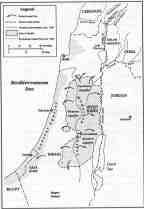Sharing water in the West Bank
Flooding in Jerusalem on Oct. 25 quelled the violence in the region, if only for a day. After 3 inches of rain fell in six hours, the Associated Press reported acts of heroism as Arabs and Jews in the southern region of Tel Aviv awoke at 4 a.m. in ground-floor apartments that were watery death traps.
These were the “blessed rains” that arrived at the end of summer. But, in a land plagued with political strife and chronic water shortages, acts of altruism are rare. Political boundaries cross over geologic ones. To achieve peace, Palestinians and Israelis must share both the land and the water.
On Dec. 13-14, the National Ground Water Association will hold a conference in Las Vegas to address cross-border water issues in the Middle East and around the world.
“Water is used as a vehicle to demonstrate power,” says conference speaker Hans Kupfersberger of Joanneum Research in Graz, Austria. Both Israelis and Palestinians depend heavily on groundwater aquifers — specifically the Mountain Aquifer, which runs along the West Bank’s north-south central axis (see map). But common management goals of the aquifer do not exist, he says. “The problem is that until today no serious hydrological investigation has been undertaken.” Others disagree, citing investigations that go back to the 1960s.
Kupfersberger is part of a three-year-old project funded by the European Commission. Due for an April completion, the project aims to develop sustainable water management in the Jordan Valley.
Who controls the water rights? The Upper Cretaceous limestone areas, where rainwater feeds the aquifer, sit below mostly Palestinian territories in the West Bank, says Yoram Eckstein of Kent State University in Ohio, who left Israel in 1974 after 17 years in the nation’s geological survey.
Yet, Palestinians’ per capita water use is an average of 50 liters a day — “half of the minimum recommended by the World Health Organization,” says hydrologist Victor Harris of Montgomery Watson in Pasadena, Calif.

Part of a satellite image
of the Dead Sea and
Jerusalem. The Mountain
Aquifer underlies much of
this contested region.
NASA

